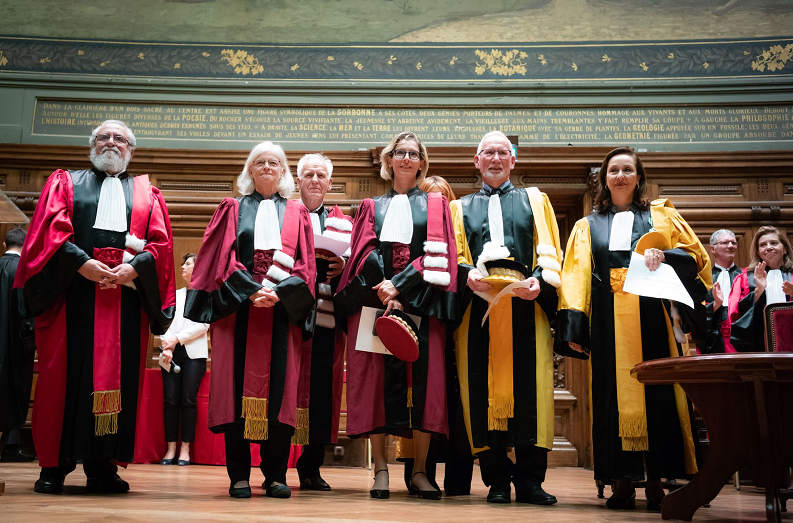International honors for EECS faculty

EECS Professor Nancy Lynch (second from left) was among seven recipients of Sorbonne University’s inaugural honorary doctorates. Photo: Courtesy of Sorbonne University
EECS Staff
Class of 1922 Professor Hal Abelson received an honorary doctorate in education from the Education University of Hong Kong (EdUHK) in November 2019. The university described Abelson as a global pioneer in computational thinking (CT) who “believes that students should move beyond mere technology consumption into problem-solving and innovation through learning about CT.”
Among other achievements, EdUHK cited Abelson’s collaboration with Google to develop MIT App Inventor, a user-friend system that helps students create their own mobile applications. Since 2016, Abelson has also contributed to CoolThink@JC, a multi-partner initiative to incorporate CT education into primary schools in Hong Kong. “In just four years, the project has benefitted over 16,500 primary students in 32 pilot schools,” EdHKU noted.
Shafi Goldwasser, the RSA Professor of EECS, received an honorary doctorate from the University of Oxford in the U.K. in June 2019. She was among seven recipients honored at the university’s Encaenia celebration honoring “remarkable people from across the world who have exemplified the university’s commitment to research, to teaching and to improving the world around us,” according to a university announcement. Goldwasser was recognized for “outstanding personal and professional achievements throughout the course of a distinguished academic career in the field of cryptography and theoretical computer science.”
Goldwasser and Institute Professor Emerita Barbara Liskov received honorary doctorates in mathematics from the University of Waterloo in Ontario, Canada, also in June 2019. The university noted that the two are among just three women to receive the Association for Computing Machinery (ACM) A.M. Turing Award — sometimes called the “Nobel Prize of computing” — in its 54-year history. (Frances Allen of IBM was the first woman recipient. Liskov won in 2009, Goldwasser in 2013.)
Goldwasser was recognized for co-inventing pseudorandom functions and zero-knowledge proofs, and for proving primality using elliptic curves while working with another co-inventor. Liskov was recognized for “research contributions making it easier to build and maintain complex computing systems,” the university stated in announcing the honorary degrees. Specifically, the university cited her pioneering research on distributed systems and fault tolerance and her influential work on programming-language design.
Nancy Lynch, NEC Professor of Software Science and Engineering, received a Doctor honoris causa from Sorbonne University in France in September 2019. Lynch, who is known for fundamental contributions to the foundations of distributed computing, was among “seven internationally renowned people whose work illustrates the universalism of science and culture,” the university noted in announcing its inaugural class of honorary-doctorate recipients.
Lynch’s work applies a mathematical approach to explore the inherent limits on computability and complexity in distributed systems. Her best-known research is the “FLP” impossibility result for distributed consensus in the presence of process failures. She heads the Theory of Distributed Computing Group in MIT’s Computer Science and Artificial Intelligence Laboratory (CSAIL).
Muriel Médard, Cecil H. Green Professor of EECS, received an honorary doctorate from the Technische Universität München in Germany in January 2020. Médard’s research interests are in the areas of network coding and reliable communications, particularly for optical and wireless networks. Her work in network coding and hardware implementation has received widespread recognition and awards, as have her original algorithms. She leads the Network Coding and Reliable Communications Group in MIT’s Research Laboratory of Electronics (RLE) and is the co-founder of three companies commercializing network coding — CodeOn, Steinwurf, and Chocolate Cloud.
John Tsitsiklis, Clarence J. Lebel Professor of Electrical Engineering and director of MIT’s Laboratory for Information and Decision Systems (LIDS), received an honorary doctorate from Harokopia University in Greece in January 2019. The university said the award was given in recognition of “his contributions to computer science, optimization theory and applications, parallel and distributed computation, approximate dynamic programming and machine learning, as well as teaching and applications of innovative research results.”
Media Inquiries
Journalists seeking information about EECS, or interviews with EECS faculty members, should email eecs-communications@mit.edu.
Please note: The EECS Communications Office only handles media inquiries related to MIT’s Department of Electrical Engineering & Computer Science. Please visit other school, department, laboratory, or center websites to locate their dedicated media-relations teams.